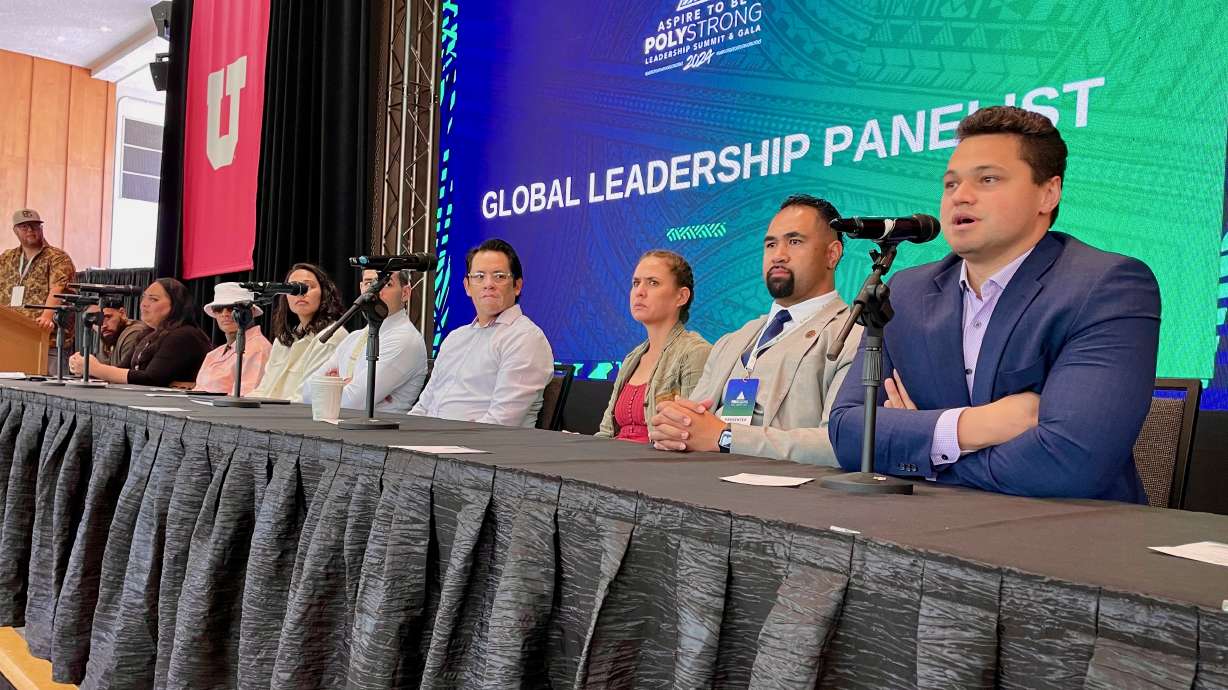Estimated read time: 3-4 minutes
This archived news story is available only for your personal, non-commercial use. Information in the story may be outdated or superseded by additional information. Reading or replaying the story in its archived form does not constitute a republication of the story.
SALT LAKE CITY — For many in the Pacific Islander community, whether newcomers to the United States or first-generation Americans, opportunities to advance can sometimes seem limited.
The measure of success for some is achievement in the entertainment industry or athletics, tough fields to crack, says Kalistina Takau, executive director of the PolyStrong Leadership Foundation.
Career possibilities can run the gamut, though, and in a bid to open Pacific Islander teens in Utah to the spectrum of opportunities available to them, the foundation held a summit Friday featuring a contingent of Pacific Islanders in a range of professions. One of the main hopes is to get Pacific Islander teens and young adults considering professions they might otherwise think are outside their realm, to get them thinking anything is possible.
"Let's get you into multimillion-dollar boardrooms and companies, so... you have a seat at the table where influence is had and decisions are made," Takau said. PolyStrong, based in Lehi, aims to empower Pacific Islanders, particularly the younger generation, and promote their professional success.
Beyond dreams of success in athletics or in entertainment, some coming from working-class backgrounds grow up with a more modest expectation — that they just get gainful employment as an adult. "Just get a job and make sure you earn a living, take care of yourself and your family," said Frank Tusieseina, the founder and chief executive officer of PolyStrong. The organization provides mentorship, networking opportunities and more.
There's nothing wrong with blue-collar work, he said, but another aim of Friday's gathering is to broaden perspectives within the Pacific Islander community. "They're not being taught or encouraged to broaden their horizons, right?" Tusieseina said. "They don't realize, no, you can do these things."
The varied Pacific Islanders who addressed the 50 or so teens at Friday morning's event, held on the University of Utah campus, came from a cross-section of professions — fashion, sports management, law, acting, law enforcement and more. They offered insights into the paths that led them to their professions, pointing to parental encouragement, the importance of confidence and belief in one's capabilities, a willingness to take chances and more.
But Takau said that at a more basic level, the physical presence of the varied speakers can trigger something. Some 60,000 native Hawaiians and others of Pacific Island descent live in Utah as of 2020, according to the University of Utah's Kem C. Gardner Policy Institute. Most are of Tongan, Samoan, Hawaiian or Fijian descent, Tusieseina said.
"Kids walk into the room and they see people that look like them, that talk like them, that come from cultures and backgrounds that they share — the light turns on that, 'Hey, I can do that too. That can be me,'" Takau said. "So we really want our young Polynesians to be reaching higher, to work for Google or be in boardrooms at the highest law firms."

David Uiagalelei — involved in college athlete management with regard to name, image and likeness, or NIL, opportunities — helped lead a workshop Friday. He has two sons playing football at the collegiate level, Florida State University and the University of Oregon, and his message centered on the import of hard work.
"It ain't about the results, it's about what you're putting in, right?" he said. "The message is just to put the work in."
Pingi Moli, an actor and filmmaker who grew up in West Valley City, was one of the panelists Friday. As a football player who dealt with the heartbreak of seeing his sports career peter out, he stressed the importance of holding on to hope. As a child of immigrant parents from Tonga, he said that can create an extra layer of pressure.
"For those who are first-generation, we carry that pressure of wanting to live out our parents' dreams," he said, and it can be hard.
A gala was held Thursday as part of the PolyStrong summit while a sports symposium is scheduled for Saturday. The PolyStrong event comes in the middle of Asian American, Native Hawaiian and Pacific Islander Heritage Month in May, though the timing is coincidental, Takau said.










